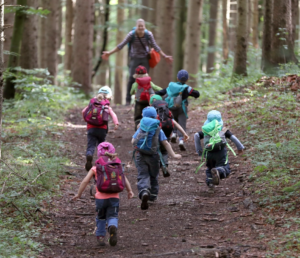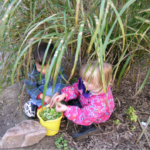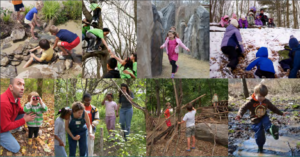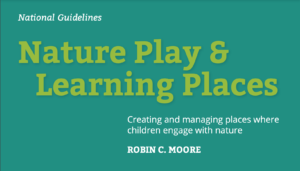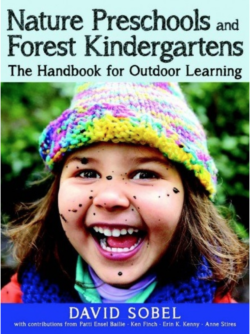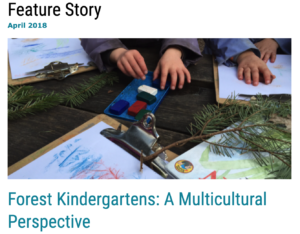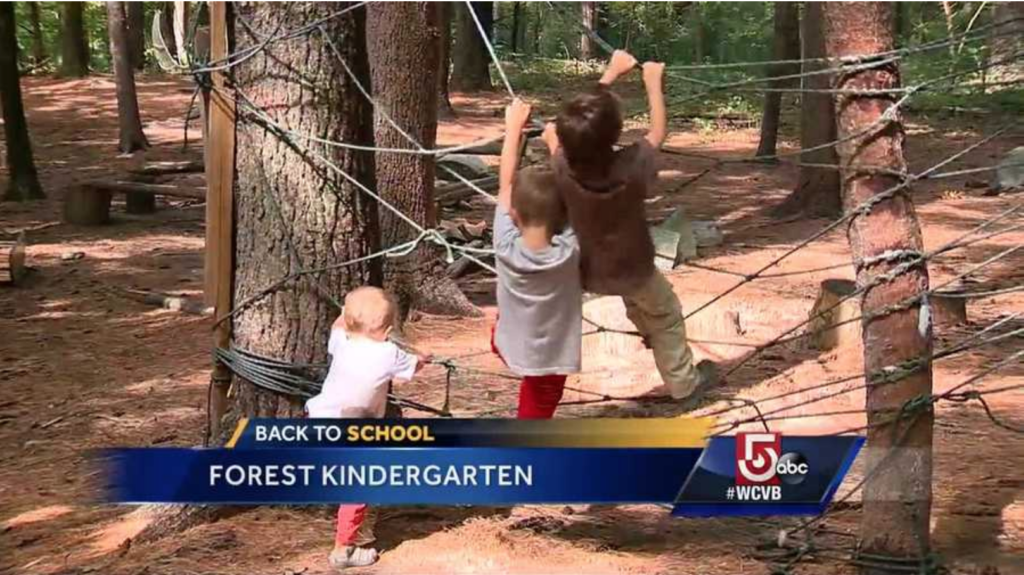“Perks of Play-in-the-Mud Educational Philosophy” from The Atlantic
“Freed from playground guardrails that constrain (even as they protect), kids build strength, develop self-confidence, and learn to manage risks as they trip, stumble, fall, hurt, and right themselves. Research shows that the freedom of unstructured time in open space helps kids learn to focus. It also just feels good: Nature reduces stress”
Read more about the benefits of outdoor play here
Natural Learning Initiative lists the many benefits of outdoor learning
“In the past decade, the benefits of connecting to nature have been well documented in numerous scientific research studies and publications. Collectively, this body of research shows that children’s social, psychological, academic and physical health is positively impacted when they have daily contact with nature”
Read the full list of positive impacts here
REI shows why forest preschools are becoming the future of early childhood education
“Physical activity is important for so many reasons. There’s the obvious ones like a healthy weight status, healthy heart, bones and all that, but getting enough physical activity can also be important for things like mental health and even learning and academic performance. One strategy for getting kids more active is to have them be outdoors more”
Watch the full video to learn more
Take a sneak peak into the Gnomes woods through the “Nature Preschools” section (Contributed by Patti Ensel Bailie)
“Forms of nature-based early childhood institutions have existed for about 100 years, with names that include forest kindergarten, waldkindergarten (German), nature school, forest school, and nature preschool (the model discussed here). All forms have one thing in common, learning through engagement with nature”
Check out the National Guidelines here
Forest Gnomes is featured in Chapter 4 of David Sobel’s “Nature Preschools and Forest Kindergartens: the Handbook for Outdoor Learning”
“The Waldkindergarten (from Wald=Forest and Kindergaten= preschool, which therefore translates as “forest preschool“) program at the Natick Community Organic Farm in Natick, MA, provides an excellent case study…the Forest Gnomes program is at home in the open forest of white pine and red oak trees”
Read an excerpt here
Gnomes teacher (Sam Leder) shares her internship experience in a Danish forest kindergarten and how she was inspired to become a Forest Gnomes teacher!
“I had the privilege of studying child development in Copenhagen, Denmark, through a semester-long internship at a forest kindergarten. Through observation and experiential learning, I started to understand more about Danish culture and pedagogy – and how the Danish approach to early childhood education contrasts with the American perspective”
Read her published article here
Amy Mevorach, Gnomes parent and writer for the Natick Town Pages, delves into the philosophy of Forest Gnomes and highlights how our play-based program encourages self-confidence, resilience, emotional regulation and most of all, how to have fun in all weather!
“The Gnomes engage with each other through an emergent, play-based curriculum. In other words, said Leder (Gnome teacher), “They’re little people going about their business.” Their business could be a hot chocolate factory, making soup or mud pies, climbing trees, hunting for slugs, or whatever they invent at the moment. They are encouraged to take risks, through which they learn to be resilient and to regulate their emotions.”
Read the “Forest Gnomes Gear Up for Winter” here
WCVB News hiked out into the Gnomes woods to learn more about how our program encourages academic readiness, creativity, problem solving skills, and life-long learning
“Everything they’re doing in the woods, from balancing rocks or picking up sticks, all of those build readiness for an academic program,” Fergason (former Gnomes teacher)said. “It’s done without pencils.”
See the full news coverage here
David Sobel, Senior Faculty in the Education Department and Director of the Center for Place-based Education at Antioch University New England, praises the Forest Gnomes as a model forest kindergarten and exemplar in nature-based education.
“The outdoor classroom is a sun-dappled acre of towering pines with smaller, scattered oaks. There are a couple of log circles, a low balance-beam structure, some homemade hobbyhorses, and a “bakery”—a sandpile with lots of kitchen equipment, a digging pit, and child-sized rough-hewn tables. The centerpiece is a storybook cottage with a steep-pitched roof…I wonder when we’re going to get out of the cold. But we don’t.”
Read the full article in Yes! Magazine here
Benefits of Nature Play
“Perks of Play-in-the-Mud Educational Philosophy” from The Atlantic
“Freed from playground guardrails that constrain (even as they protect), kids build strength, develop self-confidence, and learn to manage risks as they trip, stumble, fall, hurt, and right themselves. Research shows that the freedom of unstructured time in open space helps kids learn to focus. It also just feels good: Nature reduces stress”
Read more about the benefits of outdoor play here
Natural Learning Initiative lists the many benefits of outdoor learning
“In the past decade, the benefits of connecting to nature have been well documented in numerous scientific research studies and publications. Collectively, this body of research shows that children’s social, psychological, academic and physical health is positively impacted when they have daily contact with nature”
Read the full list of positive impacts here
REI shows why forest preschools are becoming the future of early childhood education
“Physical activity is important for so many reasons. There’s the obvious ones like a healthy weight status, healthy heart, bones and all that, but getting enough physical activity can also be important for things like mental health and even learning and academic performance. One strategy for getting kids more active is to have them be outdoors more”
Watch the full video to learn more
Publications that Feature Forest Gnomes
Take a sneak peak into the Gnomes woods through the “Nature Preschools” section (Contributed by Patti Ensel Bailie)
“Forms of nature-based early childhood institutions have existed for about 100 years, with names that include forest kindergarten, waldkindergarten (German), nature school, forest school, and nature preschool (the model discussed here). All forms have one thing in common, learning through engagement with nature”
Check out the National Guidelines here
Forest Gnomes is featured in Chapter 4 of David Sobel’s “Nature Preschools and Forest Kindergartens: the Handbook for Outdoor Learning”
“The Waldkindergarten (from Wald=Forest and Kindergaten= preschool, which therefore translates as “forest preschool“) program at the Natick Community Organic Farm in Natick, MA, provides an excellent case study…the Forest Gnomes program is at home in the open forest of white pine and red oak trees”
Read an excerpt here
Gnomes teacher (Sam Leder) shares her internship experience in a Danish forest kindergarten and how she was inspired to become a Forest Gnomes teacher!
“I had the privilege of studying child development in Copenhagen, Denmark, through a semester-long internship at a forest kindergarten. Through observation and experiential learning, I started to understand more about Danish culture and pedagogy – and how the Danish approach to early childhood education contrasts with the American perspective”
Read her published article here
Gnomes in the Local News
Amy Mevorach, Gnomes parent and writer for the Natick Town Pages, delves into the philosophy of Forest Gnomes and highlights how our play-based program encourages self-confidence, resilience, emotional regulation and most of all, how to have fun in all weather!
“The Gnomes engage with each other through an emergent, play-based curriculum. In other words, said Leder (Gnome teacher), “They’re little people going about their business.” Their business could be a hot chocolate factory, making soup or mud pies, climbing trees, hunting for slugs, or whatever they invent at the moment. They are encouraged to take risks, through which they learn to be resilient and to regulate their emotions.”
Read the “Forest Gnomes Gear Up for Winter” here
WCVB News hiked out into the Gnomes woods to learn more about how our program encourages academic readiness, creativity, problem solving skills, and life-long learning
“Everything they’re doing in the woods, from balancing rocks or picking up sticks, all of those build readiness for an academic program,” Fergason (former Gnomes teacher)said. “It’s done without pencils.”
See the full news coverage here
David Sobel, Senior Faculty in the Education Department and Director of the Center for Place-based Education at Antioch University New England, praises the Forest Gnomes as a model forest kindergarten and exemplar in nature-based education.
“The outdoor classroom is a sun-dappled acre of towering pines with smaller, scattered oaks. There are a couple of log circles, a low balance-beam structure, some homemade hobbyhorses, and a “bakery”—a sandpile with lots of kitchen equipment, a digging pit, and child-sized rough-hewn tables. The centerpiece is a storybook cottage with a steep-pitched roof…I wonder when we’re going to get out of the cold. But we don’t.”
Read the full article in Yes! Magazine here


